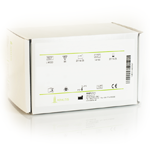| Method & Line | Sample & Target | Product | Package Info | Product | Package Info |
|---|---|---|---|---|---|
| MicroELISA | Serum | EIAgen TSH Kit | Tests per Package: 96 | ||
| EIAgen | EIAgen TSH Kit is a direct solid phase enzyme for the quantitative determination of Thyrotropin (TSH) in human serum. | Code: LI4025KF1 | Package: 1 Microplate |

For Quantity Orders: Request a Quote
Please pay attention to the revision of the document that must be the same as the revision reported in the box label.
In case of discrepancy please contact our Customer Care e-mail: info@adaltis.net.
* Other document related to the product available at Documentation Centre and it is accessible for Adaltis distributors/partners after registration only.
EIAgen TSH Kit is a direct solid phase enzyme for the quantitative determination of Thyrotropin (TSH) in human serum.
Measurement of the serum concentration of thyrotropin (TSH), a glycoprotein with a molecular weight of 28,000 daltons and secreted from the anterior pituitary, is generally regarded as the most sensitive indicator available for the diagnosis of primary and secondary (pituitary) hypothyroidism (1,2). Increase in serum concentrations of TSH, which is primarily responsible for the synthesis and release of thyroid hormones, is an early and sensitive indicator of decrease thyroid reserve and in conjunction with decreased thyroxine (T4) concentrations is diagnostic of primary hypothyroidism. The expected increase in TSH concentrations demonstrates the classical negative feedback system between the pituitary and thyroid glands. That is, primary thyroid gland failure reduces secretion of the thyroid hormones, which in turn stimulates the release of TSH from the pituitary.
Additionally, TSH measurements are equally useful in differentiating secondary and tertiary (hypothalamic) hypothyroidism from the primary thyroid disease. TSH release from the pituitary is regulated by thyrotropin releasing factor (TRH), which is secreted by the hypothalamus, and by direct action of T4 and triiodothyronine (T3), the thyroid hormones, at the pituitary. Increase levels of T3 and T4 reduces the response of the pituitary to the stimulatory effects of TRH. In secondary and tertiary hypothyroidism, concentrations of T4 are usually low and TSH levels are generally low or normal. Either pituitary TSH deficiency (secondary hypothyroidism) or insufficiency of stimulation of the pituitary by TRH (tertiary hypothyroidism) causes this. The TRH stimulation test differentiates these conditions. In secondary hypothyroidism, TSH response to TRH is blunted while a normal or delayed response is obtained in tertiary hypothyroidism.
Further, the advent of immunoenzymometric assays has provided the laboratory with sufficient sensitivity to enable the differentiating of hyperthyroidism from euthyroid population and extending the usefulness of TSH measurements. This method is a second-generation assay, which provides the means for discrimination in the hyperthyroid-euthyroid range. The functional sensitivity (<20% between assay CV) of the one-hour procedure is 0.195 µIU/mL while the two-hour procedure has a functional sensitivity of 0.095µIU/mL (3).
In this method, TSH calibrator, patient specimen or control is first added to a streptavidin coated well. Biotinylated monoclonal and enzyme labeled antibodies are added and the reactants mixed. Reaction between the various TSH antibodies and native TSH forms a sandwich complex that binds with the streptavidin coated to the well.
After the completion of the required incubation period, the antibody bound enzyme-thyrotropin conjugate is separated from the unbound enzyme-thyrotropin conjugate by aspiration or decantation. The activity of the enzyme present on the surface of the well is quantitated by reaction with a suitable substrate to produce color.
The employment of several serum references of known thyrotropin levels permits construction of a dose response curve of activity and concentration. From comparison to the dose response curve, an unknown specimen's activity can be correlated with thyrotropin concentration.
Immunoenzymometric assay.
The essential reagents required for an immunoenzymometric assay include high affinity and specificity antibodies (enzyme conjugated and immobilized), with different and distinct epitope recognition, in excess, and native antigen. In this procedure, the immobilization takes place during the assay at the surface of a microplate well through the interaction of streptavidin coated on the well and exogenously added biotinylated monoclonal anti-TSH antibody.
Upon mixing monoclonal biotinylated antibody, the enzyme-labeled antibody and a serum containing the native antigen, reaction results between the native antigen and the antibodies, without competition or steric hindrance, to form a soluble sandwich complex.
Simultaneously, the complex is deposited to the well through the high affinity reaction of streptavidin and biotinylated antibody.
After equilibrium is attained, the antibody‑bound fraction is separated from unbound antigen by decantation or aspiration. The enzyme activity in the antibody‑bound fraction is directly proportional to the native antigen concentration. By utilizing several different serum references of known antigen values, a dose response curve can be generated from which the antigen concentration of an unknown can be ascertained.
The kit contains reagents for 96 tests (code LI4025KF1).
Bring reagents to room temperature before use.
|
Microplate Calibrators Conjugate Substrate TMB Stop Solution Wash Buffer Conc. 50X Adhesive Films |
12x8 wells 7x1 mL/vials 1x13 mL/vial 1x16 mL/vial 1x15 mL/vial 1x20 mL/vial 2 |
|
Number of tests |
96 |
|
Code |
LI4025KF1 |
Need assistance to make an order? Contact Sales & Orders Centre order@adaltis.net.
For Application Support application@adaltis.net